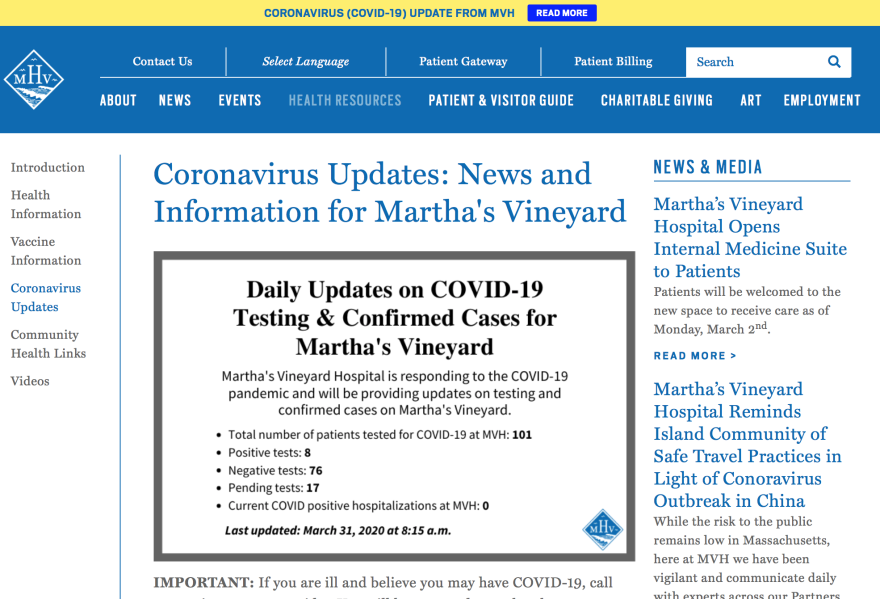How and where we get local information about COVID-19 cases is becoming part of the story of how this pandemic unfolds. Morning Edition host Kathryn Eident talked with WCAI reporter Jennette Barnes about gathering accurate news as the picture changes rapidly.
Eident: Each day we bring you the latest number of infections, hospitalizations and deaths due to the spread of COVID-19. At the beginning of the pandemic, many of us in the press relied on the state Department of Public Health. We still do. But as this infection has begun to spread and increased testing has shown a sharp rise in cases, local officials have been releasing their own information to the press and to the public.

WCAI reporter Jennette Barnes joins us now on the line to explain just how and where we get reliable information about COVID-19 and its spread around the Cape, the South Coast and the Islands. Jennette, good morning. Thanks for joining us.
Barnes: Good morning.
Eident: So you've been talking nearly every day to county and hospital officials throughout this pandemic to get the most up-to-date information on what's going on. And I think one thing we've learned in reporting this pandemic over the last few weeks is that with so many communities in our region, there isn't just one place to get information. And I think a good example of that is our efforts to try to get town-by-town breakdowns of cases. That's a little harder than we might think.
Barnes: Yes. Some organizations have been more willing than others to share data. Sean O'Brien, who is the director of health for Barnstable County, holds a daily media call, and during one of those calls he did give a town-by-town breakdown of cases, but after that, he said he didn’t want to release new data before the towns released it.
Yesterday, the communications manager for the county told me that the commonwealth actually prefers they report only countywide numbers. She said it's up to each town whether they release their own numbers or not. And she said the Department of Public Health actually prefers they don't. She shared the official state guidance on that issue, which says the state understands that local authorities may want to share the number of cases or the number of deaths, but if they do, they should be very careful about privacy.

Eident: Privacy certainly is a huge issue, as this is a medical thing. Hospitals have been releasing some of their own information, but not all of them are having regular briefings. Right?
Barnes: Right. The hospitals on Martha's Vineyard and Nantucket have become the main sources of information about cases on the Islands. Martha's Vineyard Hospital said yesterday it plans to start doing weekly briefings and to update its website every day with things like the number of cases and the number of people hospitalized. Nantucket Cottage Hospital already does daily posting of test data. So those hospitals have been pretty transparent.
On the Cape, with 15 towns, the picture really is more complicated. Cape Cod Healthcare set up a weekly media call early in the outbreak, but canceled that weeks ago. Since then, they've only held one briefing, and they said going forward, they'll do it in an ad hoc fashion, whenever they feel it's necessary.
Eident: And of course, we know Cape Cod Healthcare operates Cape Cod Hospital and Falmouth Hospital, among other things. So they're pretty critical. What have they been providing since that announcement?

Barnes: Well, they did provide some fairly revealing information at that media briefing. So it's not like they're not talking at all. They said, as everyone may have heard already, they could run out of at least one type of personal protective equipment and as little as eight days, but they wouldn't specify what it was.
Mike Lauf, the CEO, gave some patient data. This was Wednesday. He said Falmouth Hospital had three patients in intensive care, and so forth. He also said revenue was down 52 percent. He wouldn't say how many ventilators they have.
Eident: OK. We just have a few seconds left. What about the South Coast? Is it true that Southcoast Health did not even make a public announcement when their testing site opened?
Barnes: Yes. So that's the group that owns Tobey, St. Luke's and Charleton. They said they put out the word within their own community, really meaning their employees. It was not posted on social media. They just waited for the word to get out. And then they answered some media calls. And they also asked the media not to reveal the location of the test site so that people wouldn't show up without an appointment.

Eident: And so do you think the difference between maybe the Islands and some of these bigger organizations is just that? You know, these big organizations have just a bigger area and more to encompass and they have these protocols, maybe these strict protocols in place with communication.
Barnes: That might be one answer, yeah. The bigger organizations naturally serve a wider area. They deal with a lot of different media outlets. The smaller ones, like on the Islands, they are part of a tight-knit community. They may view their communications protocol differently.
Eident: All right. Well, thank you for doing this, Jennette. We really appreciate it. That's WCAI reporter Jennette Barnes.








